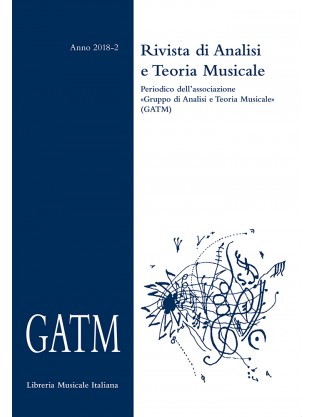 View larger
View larger
L’esperienza della musica elettronica e la sperimentazione di una forma aperta: scrittura per gruppi e percorsi esecutivi nel Klavierstück V di Karlheinz Stockhausen
| Author | Egidio Pozzi |
| Series | Rivista di Analisi e Teoria Musicale |
| Size | 17×24, pp. 136 (25-57) |
| Year | 2018 |
| ISBN | 9788855430081 |
For Stockhausen, the years between 1952 and the early 60s was a period of experimentation as regards both form and serial structures. Such turning point was reasonably influenced by his contemporary explorations in electronic music, the ones which opened his eyes on renewed horizons of multi-levelled serial structuring for the manifold musical parameters. Robin Maconie has noted in that respect that Klavierstücke V-VIII, while maintaining their character as “studies”, are different from the first series (I-IV) for their abandoning an abstract formal organisation, as well as their marked orientation towards more tangible features, such as sonority, temporal unfolding, and quality of listening. However, in those years his interest did involve not only the “non-quantifiable” parameters of writing and performance, but also the overcoming of the received rhetoric-formal principles of “beginning-development-end”.
This article focuses in particular on Klavierstück V to understand whether the role played by parameters derived from experiences in electronic music maintains, on an overall formal level, the desired distance from any kind of traditional and/or processual formal conception. The analysis rests on a close scrutiny of both the score and real performances by Aloys Kontarsky, Vanessa Benelli Mosell, and Maurizio Pollini. At the same time, a detailed investigation of the group writing and the overall form of the piece allows us to identify a few “performance paths” marked by specific trends in parameters, including choices in tempo and dynamics.
Egidio Pozzi is Associate Professor of Musicology and History of Music at the University of Calabria. Since 2012 he is President of the Group of Analysis and Music Theory and participates in research sessions, seminars, round tables and masterclass in various public institutions. He has written articles on musical hermeneutics and interpretation, on western classical music and on analytic methodologies, among which Schenkerian analysis. Towards an organic interpretation of musical structure (LIM), written in 1995 with William Drabkin and Susanna Pasticci (1999, second edition). In 2007 he published the volume Antonio Vivaldi (L’Epos); in 2009, this book was awarded the “Pomaricum. Premio Antonio Vivaldi” Prize.
Since 2014 he is Director of Master in Music Theory and Analysis, organized by the University of Calabria and by other prestigious Italian musical institutions and foundations.

